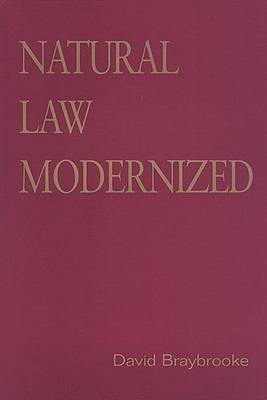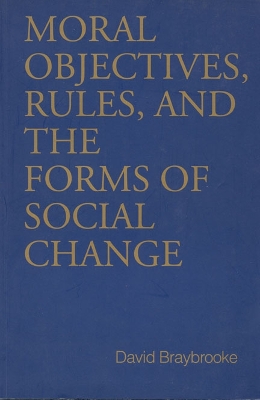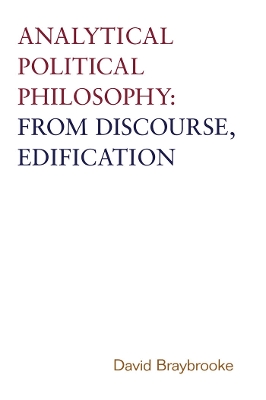Toronto Studies in Philosophy
4 total works
Hobbes, Locke, Hume, and Rousseau are classic modern philosophers, widely consulted in matters of ethics and political theory. In this provocative study David Braybrooke challenges received scholarly opinion by arguing that these canonical theorists took St Thomas Aquinas as their point of reference, reinforcing rather than departing from his natural law theory.The natural law theory of St Thomas Aquinas is essentially a secular theory, says Braybrooke. He argues that Hobbes, Locke, Hume, and Rousseau share a core of thought that not only has roots in St Thomas but offers an alternative to other ethical theories now current. According to Braybrooke, this surviving and reinforced core qualifies as an ethical theory viable by the most sophisticated standards, meeting the main challenges of analytical metaethics, and thus standing up to the scrutiny that any ethical theory must undergo in contemporary philosophical discussions. Braybrooke's study takes the reader into a rich and compelling intellectual universe, one in which medieval natural law theory, widely ignored as obsolete, survives robustly through the modern canon and into the third millennium.
Moral Objectives, Rules, and the Forms of Social Change
by David Braybrooke
Published 1 January 1998
Assorted fruit from forty years' writing, these essays by David Braybrooke discuss (in Part One of the book) a variety of concrete, practical topics that ethical concerns bring into politics: people's interests; their needs as well as their preferences; their work and their commitment to work; their participation in politics and in other group activities. Essays follow on the justice with which theme matters are arranged for and on the common good in which they are consolidated. Justice here inspires a 'departures' approach, which moves from agreement on departures from commutative justice to agreement on measures of distributive justice needed to forestall such departures. Another essay (first published here) radically undermines the odd but entrenched belief that utilitarianism classically licenced, even prescribed, systematically sacrificing the happiness of some people to give others greater pleasure. Part II and Part III of the book concentrate upon the subject of settled social rules, which are devices for securing the objectives treated in Part I.
Part II shows that rules are ubiquitous in ethics, since there are no virtues without rules, just as there are no (justified) rules; without virtues. Part Two also shows that rules are as ubiquitous in social phenomena as the causal regularities sought by one school of social science. Part III captures the dialectic of history at least in part by a logical analysis of changes in rules following the onset of quandaries. It then considers how political choices can be both prudent, by keeping within duly considered incremental limits, and yet imaginative enough to escape the recent embarrassments generated by social choice theory. Characteristically versatile in topic and style, Braybrooke offers original light on all theme subjects. One reader has commented, '[His] prose is elegant and always a pleasure to read. Some of the pieces are nothing short of brilliant.' Which did the reader have in mind? Readers may differ (they already have) on just which pieces they would rank highest.
Part II shows that rules are ubiquitous in ethics, since there are no virtues without rules, just as there are no (justified) rules; without virtues. Part Two also shows that rules are as ubiquitous in social phenomena as the causal regularities sought by one school of social science. Part III captures the dialectic of history at least in part by a logical analysis of changes in rules following the onset of quandaries. It then considers how political choices can be both prudent, by keeping within duly considered incremental limits, and yet imaginative enough to escape the recent embarrassments generated by social choice theory. Characteristically versatile in topic and style, Braybrooke offers original light on all theme subjects. One reader has commented, '[His] prose is elegant and always a pleasure to read. Some of the pieces are nothing short of brilliant.' Which did the reader have in mind? Readers may differ (they already have) on just which pieces they would rank highest.
The analytic movement has long been the dominant philosophical tradition in English-speaking countries. In Analytical Political Philosophy: From Discourse, Edification, distinguished Canadian philosopher David Braybrooke explores this movement by bringing together some of his earlier free-standing studies of the concepts of needs, rights, and rules. He combines the results with an analytical account of how to deal with consequences and thus, arrives at a program for public policy, comparable in generality at least and in trenchancy to the programs offered by Rawls, Nozick, and Gauthier. Braybrooke illustrates how his program can deal robustly with the worst evils of recent politics, which on point after point defy and reverse what the program calls for. An essay that relates the program to utilitarianism and natural law theory brings to an end, not only the present book, but the series of books, all published by University of Toronto Press, beginning with Moral Objectives, Rules, and the Forms of Social Change (1998), and continuing with Natural Law Modernized (2001) and Utilitarianism: Restorations; Repairs; Renovations (2004).
The four books, which embrace all the main themes of Braybrooke's life-work, form a mutually reinforcing whole that invites being called the author's Summa Philosophica.
The four books, which embrace all the main themes of Braybrooke's life-work, form a mutually reinforcing whole that invites being called the author's Summa Philosophica.
Utilitarianism, belaboured by repeated counterexamples, has fallen out of favour as an ethical theory. In Utilitarianism: Restorations; Repairs; Renovations, noted Canadian philosopher David Braybrooke revisits Jeremy Bentham's master idea that statistical evidence should determine social policies, and - perhaps surprisingly, given Braybooke's recent championship of natural law - dispels the discredit that standard versions of utilitarianism have invited. On the issue between rule-utilitarianism (which gives due weight to rules) and act-utilitarianism (which does not), Braybrooke argues that act-utilitarianism cannot be carried out even in principle except under the auspices of rules. He shows that the problem with not knowing all consequences ahead of time vanishes if decisions are subject to continual rounds of revision. Invoking the elementary statistical principle that groups should not be changed in membership just to get more favourable results, he disposes of the accusation that utilitarianism prescribes gratuitous life-sacrifices.
Substituting comparative censuses for the hedonistic calculus that figures in standard utilitarianism, Braybrooke excludes gratuitous sacrifices also of happiness short of life-sacrifices. The census notion is proof against the self-contradictory advice that the calculus sometimes supplies. Moreover, it readily accommodates evidence about happiness and needs, both better pursued by dropping the notion of utility. Recast in these ways, utilitarianism takes on a very different guise from the standard versions; it is notwithstanding a guise congenial to Bentham's master idea, and its affinity with the utilitarian tradition and ordinary language shows up in the full intelligibility that it gives to the slogan, "the greatest happiness of the greatest number."
Substituting comparative censuses for the hedonistic calculus that figures in standard utilitarianism, Braybrooke excludes gratuitous sacrifices also of happiness short of life-sacrifices. The census notion is proof against the self-contradictory advice that the calculus sometimes supplies. Moreover, it readily accommodates evidence about happiness and needs, both better pursued by dropping the notion of utility. Recast in these ways, utilitarianism takes on a very different guise from the standard versions; it is notwithstanding a guise congenial to Bentham's master idea, and its affinity with the utilitarian tradition and ordinary language shows up in the full intelligibility that it gives to the slogan, "the greatest happiness of the greatest number."



